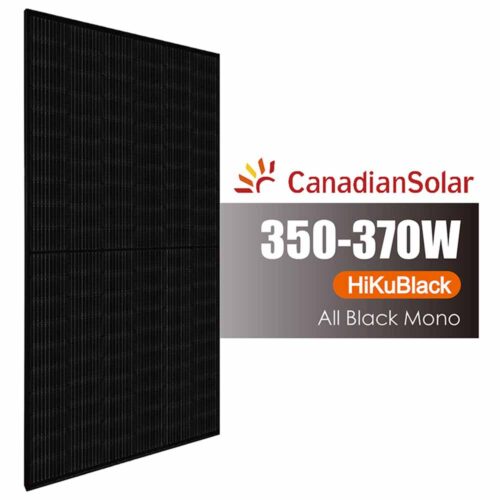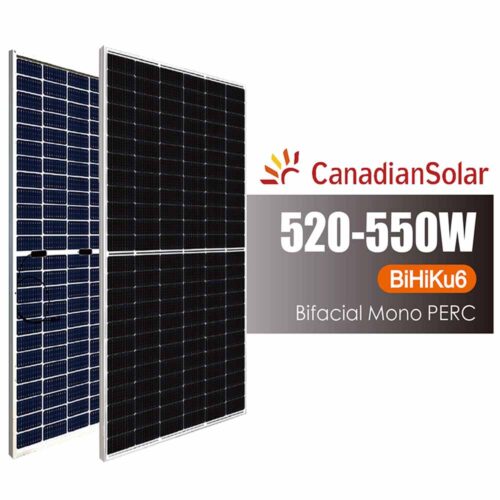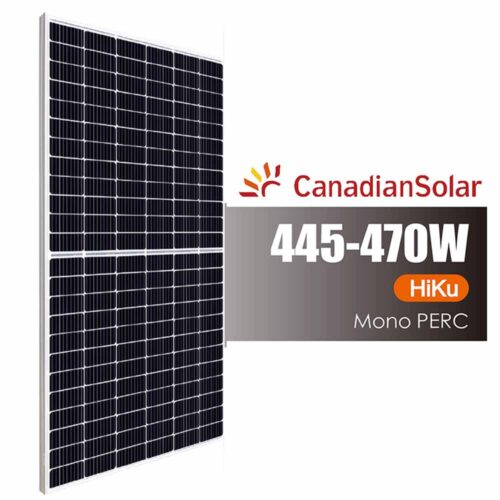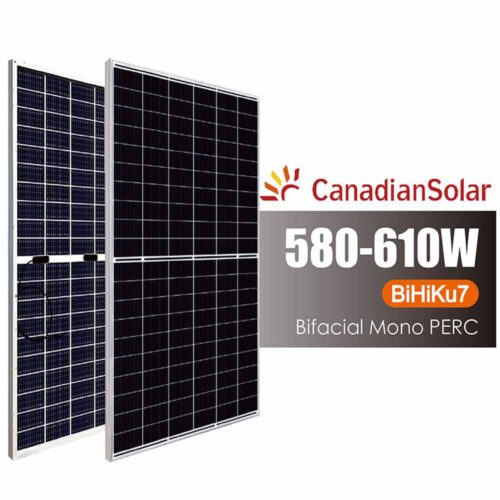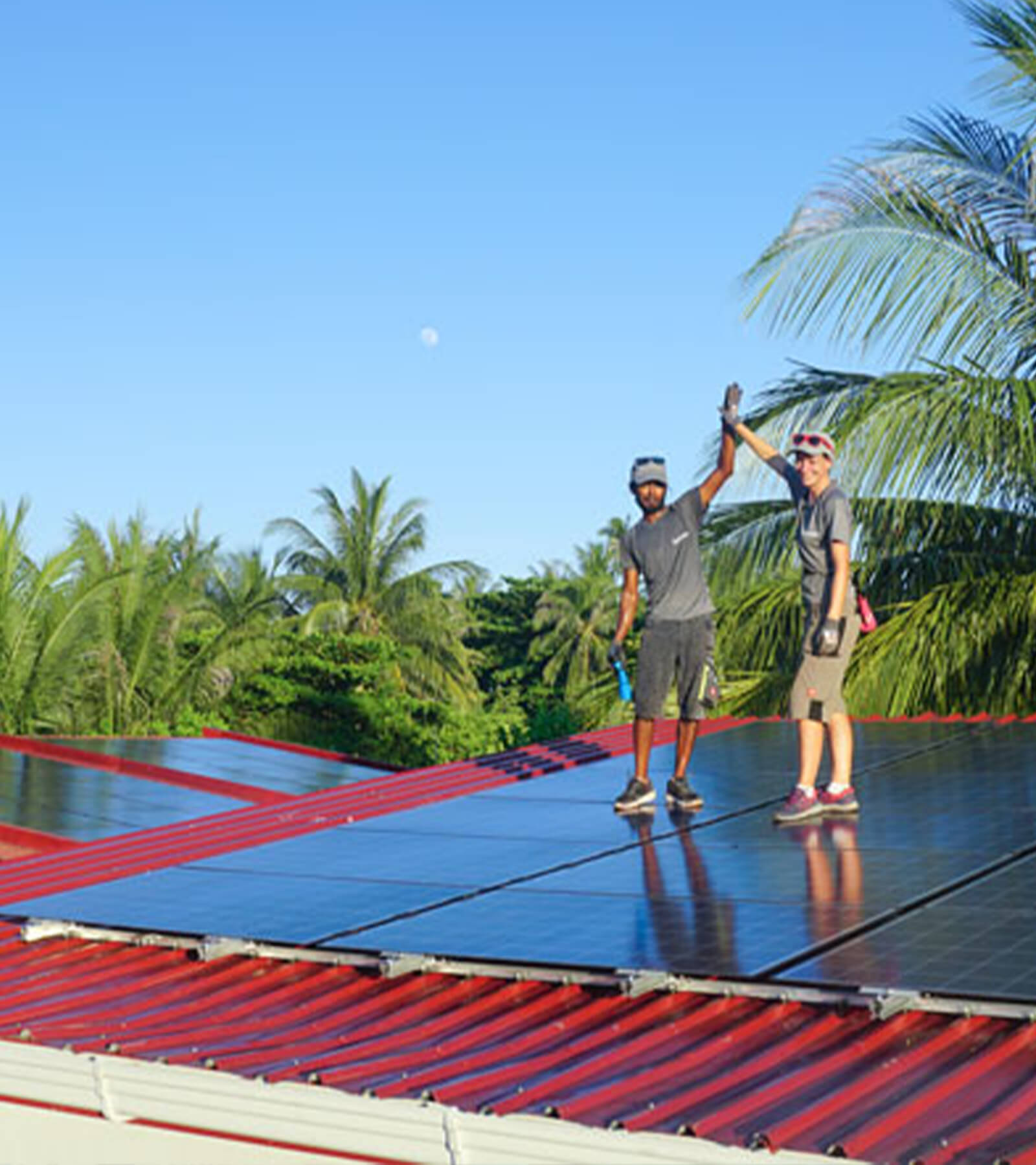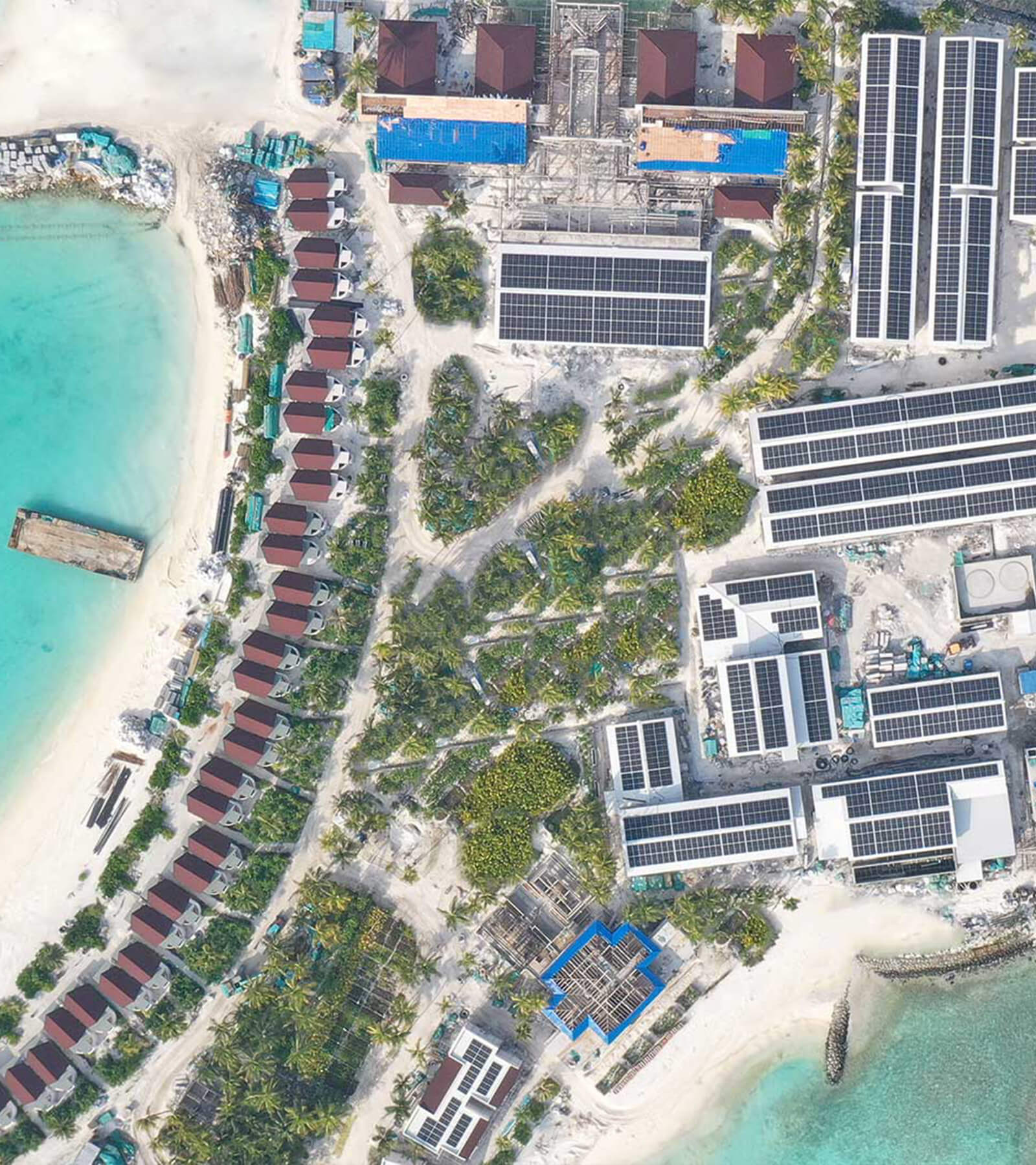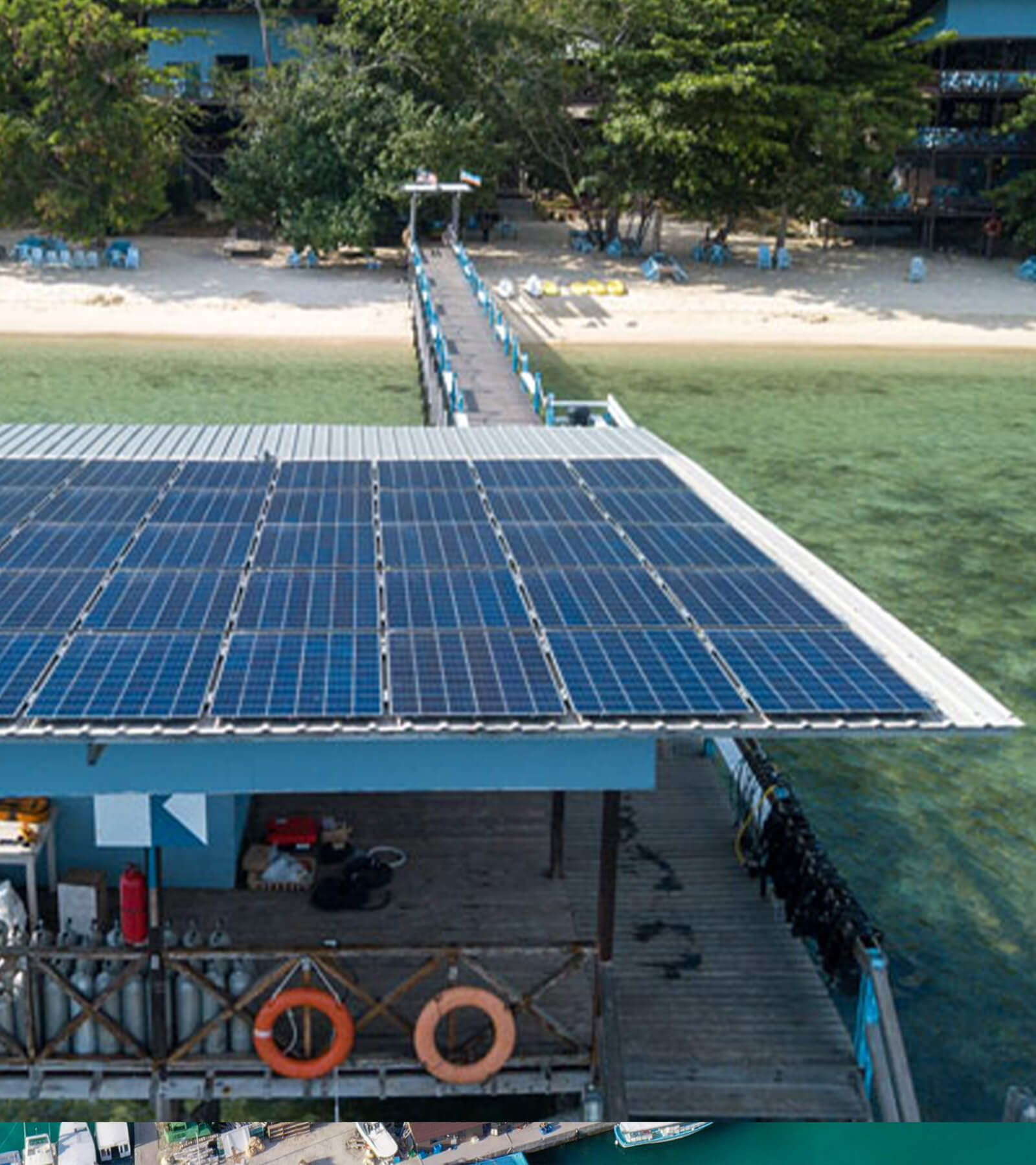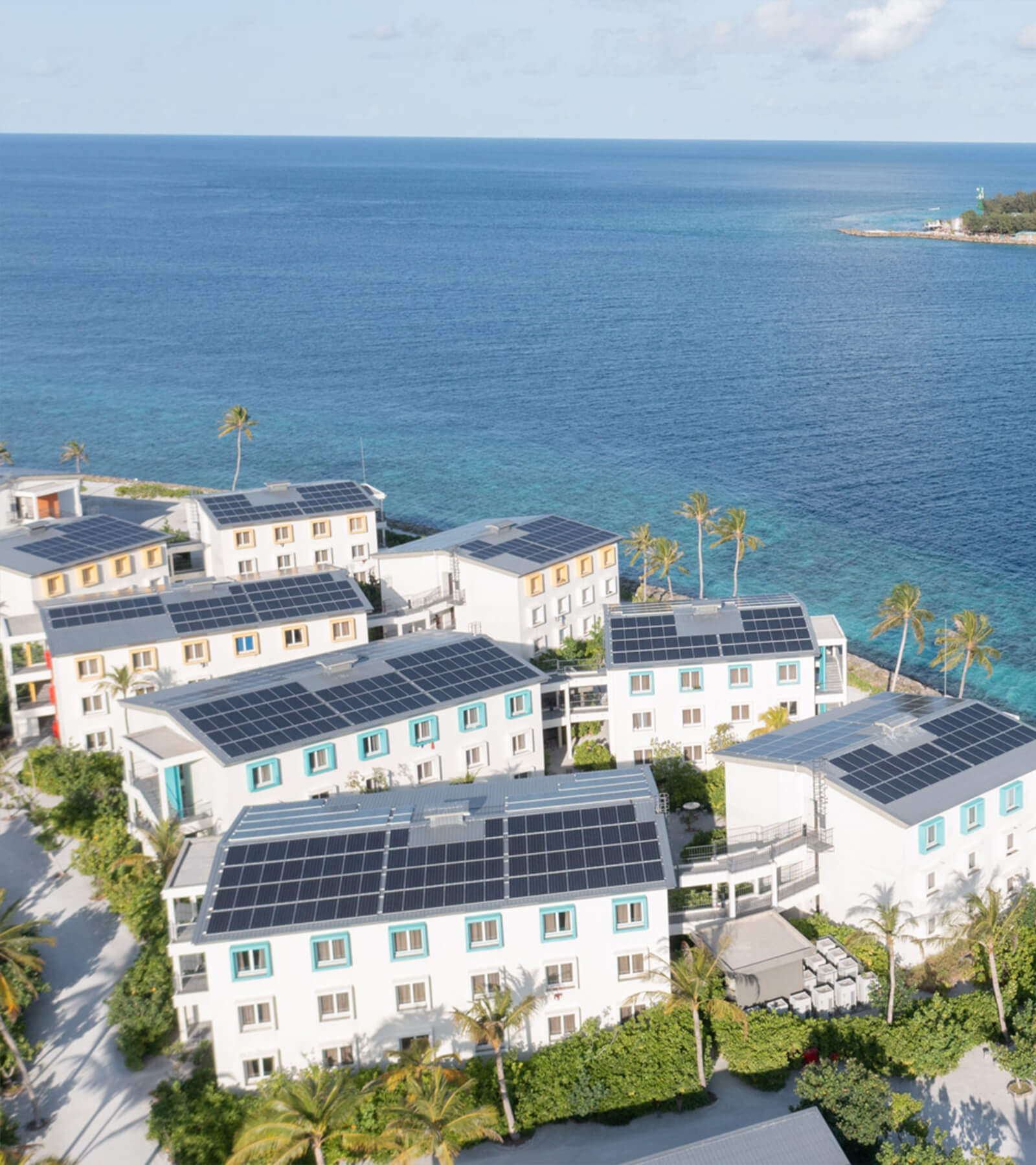As a leading one-stop solar solutions provider, Maxbo often gets asked this question: “How many solar panels do I need for 100 kWh?” The answer depends on multiple factors, but here’s the quick conclusion:
- 100 kWh in one hour: Around 160 panels.
- 100 kWh in one day: Around 39 panels.
- 100 kWh in one month: Only 2 panels.
To determine the exact number, we’ll analyze key factors like panel wattage, timeframe, and environmental conditions. In this article, we’ll provide detailed calculations and insights, especially tailored for European conditions, to help you design the ideal solar system.
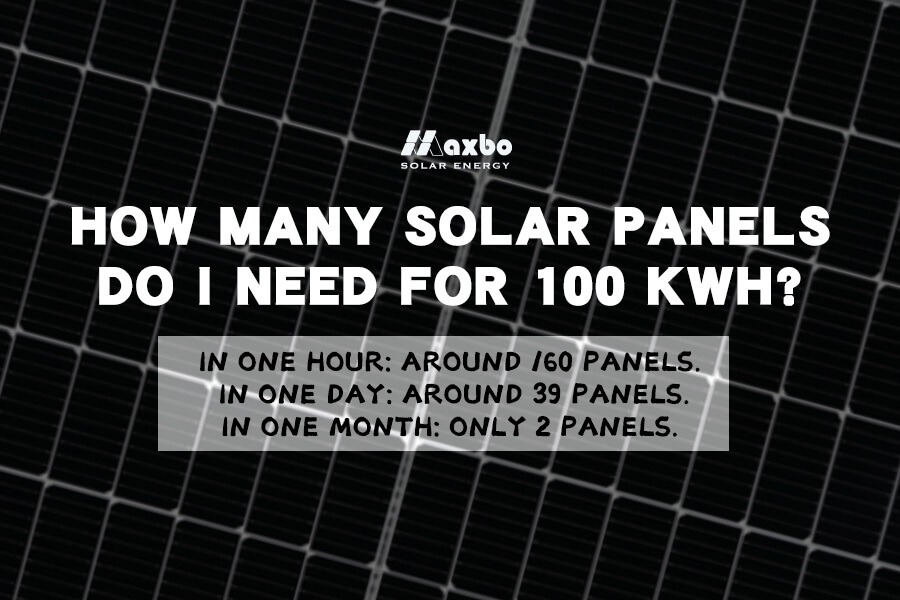
Panel Size and Efficiency
The size and efficiency of the solar panels are critical factors in determining how many panels are needed to generate 100 kWh. Solar panels typically range in power output from 500W to 700W, and the wattage of the panels directly affects the number required.
Let’s explore this factor with different scenarios and detailed calculations.
Scenario 1: Generating 100 kWh in One Hour
To calculate the number of panels required to generate 100 kWh in a day, we assume 4 hours of effective sunlight per day (typical in Europe). Here’s how it works:
| Solar Panel Wattage | Energy Produced Per Hour | Number of Panels for 100 kWh |
|---|---|---|
| 500W | 0.5 kW | 200 panels |
| 550W | 0.55 kW | 182 panels |
| 600W | 0.6 kW | 167 panels |
| 650W | 0.65 kW | 154 panels |
| 700W | 0.7 kW | 143 panels |
Calculation Example
With 650W panels, each panel generates 0.65 kW. To produce 100 kW:
100 kW ÷ 0.65 kW = 153.85 panels (rounded up to 154 panels).
Conclusion
To generate 100 kWh in one hour, you’ll need 143-200 panels, depending on the panel wattage.
Scenario 2: Generating 100 kWh in One Day
To calculate the number of panels required to generate 100 kWh in a day, we assume 4 hours of effective sunlight per day (typical in Europe). Here’s how it works:
| Solar Panel Wattage | Energy Produced Per Day (4 Hours) | Number of Panels for 100 kWh |
|---|---|---|
| 500W | 2 kWh | 50 panels |
| 550W | 2.2 kWh | 46 panels |
| 600W | 2.4 kWh | 42 panels |
| 650W | 2.6 kWh | 39 panels |
| 700W | 2.8 kWh | 36 panels |
Calculation Example
Let’s say you choose 650W panels. Each panel produces 2.6 kWh per day (4 hours × 650W ÷ 1,000). To meet the target of 100 kWh:
100 kWh ÷ 2.6 kWh = 38.46 panels (rounded up to 39 panels).
Conclusion
To generate 100 kWh in one day, you will need 36-50 panels, depending on the panel wattage.
Scenario 3: Generating 100 kWh in One Week
For a weekly energy target, we assume 4 hours of sunlight per day and a total of 7 days:
| Solar Panel Wattage | Energy Produced Per Week (28 Hours) | Number of Panels for 100 kWh |
|---|---|---|
| 500W | 14 kWh | 8 panels |
| 550W | 15.4 kWh | 7 panels |
| 600W | 16.8 kWh | 6 panels |
| 650W | 18.2 kWh | 6 panels |
| 700W | 19.6 kWh | 6 panels |
Calculation Example
Using 650W panels, each panel generates 18.2 kWh in a week (28 hours × 650W ÷ 1,000). To meet 100 kWh:
100 kWh ÷ 18.2 kWh = 5.49 panels (rounded up to 6 panels).
Conclusion
To generate 100 kWh in a week, you’ll need 6-8 panels, depending on the panel wattage.
Scenario 4: Generating 100 kWh in One Month
For a monthly energy target, we assume 30 days of sunlight, with 4 hours per day:
| Solar Panel Wattage | Energy Produced Per Week (28 Hours) | Number of Panels for 100 kWh |
|---|---|---|
| 500W | 60 kWh | 2 panels |
| 550W | 66 kWh | 2 panels |
| 600W | 72 kWh | 2 panels |
| 650W | 78 kWh | 2 panels |
| 700W | 84 kWh | 2 panels |
Calculation Example
Using 700W panels, each panel generates 84 kWh per month (120 hours × 700W ÷ 1,000). To meet 100 kWh:
100 kWh ÷ 84 kWh = 1.19 panels (rounded up to 2 panels).
Conclusion
To generate 100 kWh in a month, you’ll need only 2-3 panels, depending on the panel wattage.
Efficiency Considerations
No solar panel operates at 100% efficiency due to factors like temperature, shading, and system losses (e.g., inverter losses). At Maxbo, we estimate system losses of 10-20%. To account for these losses, you’ll need to oversize your system slightly.
| Solar Panel Wattage | Adjusted Energy Output / Day (85% Efficiency) | Number of Panels for 100 kWh |
|---|---|---|
| 500W | 1.7 kWh | 59 panels |
| 550W | 1.87 kWh | 54 panels |
| 600W | 2.04 kWh | 49 panels |
| 650W | 2.21 kWh | 46 panels |
| 700W | 2.38 kWh | 42 panels |
Final Conclusion
The number of solar panels required to generate 100 kWh depends on the timeframe and panel wattage:
- In one hour: 143-200 panels.
- In one day: 36-50 panels.
- In one week: 6-8 panels.
- In one month: 2 panels.
At Maxbo, we recommend high-efficiency panels like our 650W and 700W monocrystalline models to minimize the number of panels needed while maximizing performance. Visit Maxbo for more information and tailored solutions.
Factor 2: Timeframe
The timeframe for generating 100 kWh plays a crucial role in determining the size of the solar system. Whether you need to produce this energy in one hour, one day, or over a month will significantly impact the number of panels required.
For instance:
- 100 kWh in one hour requires a large industrial-scale system of 154 panels (650W).
- 100 kWh in one day can be achieved with 39 panels (650W).
- 100 kWh in one month only needs 2-3 panels (650W).
This highlights how energy goals must align with available sunlight and panel efficiency. At Maxbo, we tailor solutions to meet your specific energy timeframe, maximizing performance and cost efficiency. Visit Maxbo for more details.
Factor 3: Environmental Conditions
The third critical factor is the environmental conditions and operational efficiency of your solar system. Even the best panels can’t reach their full potential without accounting for these considerations:
Sunlight Availability (Solar Irradiance)
In Europe, sunlight availability (measured in peak sun hours) varies greatly depending on location:
- Southern Europe (e.g., Spain, Italy): 5-6 hours of sunlight per day.
- Central Europe (e.g., Germany, France): 3-4 hours per day.
- Northern Europe (e.g., Sweden, Norway): 2-3 hours per day.
For example:
A 25 kW system in Spain with 6 sun hours requires fewer panels compared to the same system in Germany with 4 sun hours.
System Losses
Solar systems typically lose 10-20% efficiency due to:
- Inverter losses (5-10%).
- Dirt and shading on panels (3-5%).
- Temperature effects (5-7%).
To compensate for these losses:
- Multiply your energy requirement by 1.1 to 1.2.
For instance:
if you need 100 kWh, you should design a system capable of producing 110-120 kWh.
Weather Variability
Cloudy conditions, snow, and seasonal changes can reduce sunlight. Northern Europe, for instance, experiences significant seasonal variability. In such cases, it’s wise to oversize the system slightly to ensure consistent output.
Comprehensive Example:
Let’s consider two scenarios:
Scenario 1: Residential System in Germany
Daily Energy Goal: 100 kWh.
Sunlight Availability: 4 hours per day.
Panel Wattage: 650W monocrystalline.
System Losses: 15%.
Calculation:
Required system size = 100 kWh ÷ (4 hours × 650W × 85%) ≈ 45 panels.
Scenario 2: Commercial System in Spain
Daily Energy Goal: 100 kWh.
Sunlight Availability: 6 hours per day.
Panel Wattage: 700W monocrystalline.
System Losses: 10%.
Calculation:
Required system size = 100 kWh ÷ (6 hours × 700W × 90%) ≈ 27 panels.
Why Maxbo Is Your Best Choice for Solar Solutions
At Maxbo, we don’t just sell solar panels—we design comprehensive solutions tailored to your energy needs. Whether you’re powering a small home in Germany or a large factory in Spain, we offer:
- High-efficiency panels ranging from 500W to 700W.
- Customized system designs to maximize energy production.
- Support for installation, maintenance, and energy management.
Visit Maxbo Solar to explore our full range of products and solutions.
Conclusion: How Many Solar Panels Do I Need for 100 kWh?
To summarize, the number of solar panels required to generate 100 kWh depends on several factors, but here are the key results based on 650W panels:
- 100 kWh in one hour: Approximately 154 panels.
- 100 kWh in one day: Approximately 39 panels.
- 100 kWh in one week: Approximately 6 panels.
- 100 kWh in one month: Approximately 2-3 panels.
At Maxbo, we provide customized solar solutions to fit your specific energy needs. Whether it’s for residential, commercial, or industrial use, our high-efficiency 650W and 700W panels ensure optimal performance. Visit Maxbo to learn how we can help you harness the power of solar energy effectively.
Website: www.maxbo-solar.com
Email: [email protected]
Solar System Price for Home Solar System Price for Home Solar System Price for Home Solar System Price for Home Solar System Price for Home Solar System Price for Home Solar System Price for Home Solar System Price for Home Solar System Price for Hom
Solar System Price for Home Solar System Price for Home Solar System Price for Home Solar System Price for Home Solar System Price for Home Solar System Price for Home Solar System Price for Home Solar System Price for Home

